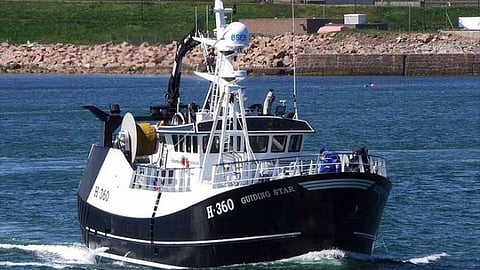Inadequate risk assessment blamed for collision between two fishing vessels off Scotland
The UK Marine Accident Investigation Branch (MAIB) has published its report on the investigation into a collision between two fishing vessels in the North Sea off Scotland on October 6, 2022.
Summary
At 11:49 local time on the said date, the pair trawlers Guiding Light and Guiding Star collided during a routine fish transfer. Guiding Star’s stern was breached and flooded. The crew unsuccessfully attempted to pump out the floodwater, and the vessel foundered about an hour later.
The eight crew evacuated to a liferaft, which capsized during the accident; five were recovered to Guiding Light and the remaining three were winched to a coastguard rescue helicopter. All crew survived unharmed.
Safety issues
The fish transfer had not been risk assessed and, during the operation, Guiding Light’s wheelhouse was left unattended, which meant the skipper was not at the navigational controls to prevent the collision.
As a fishing vessel less than 24 metres in length, Guiding Star was not required to meet any damage stability criteria. Consequently, when floodwater entered the hull it caused a rapid reduction in buoyancy and loss of stability. The accident has highlighted the importance for fishermen to be prepared for such emergencies and to know when to abandon ship. The Fishermen’s Safety Guide, published by the Maritime and Coastguard Agency (MCA) provided guidance to help crews develop flood action plans, and Marine Guidance Notice (MGN) 570 Amendment No.1 (F): Fishing Vessels: Emergency Drills provided drill scenarios to practice such plans.
The lifejackets and immersion suits on board Guiding Star were stored in crew cabins that had flooded, rendering them inaccessible before abandonment. MGN 570 (F) advised fishermen to consider suitable storage locations for lifejackets.
Recommendations and related publications
The Maritime and Coastguard Agency has been recommended (2024/134) to review its flooding prevention guidance to ensure that the consequences of flooding on fishing vessels are highlighted appropriately. The manager of the vessels has been recommended (2024/135 and 2024/136) to evaluate the impact of fishing operations on watchkeeping and make sure that its crews are prepared for flooding emergencies.
A safety flyer to the fishing industry was produced with this report, signposting the importance of keeping a safe navigational watch at all times; emergency preparedness and understanding individual’s fishing vessel survivability.


